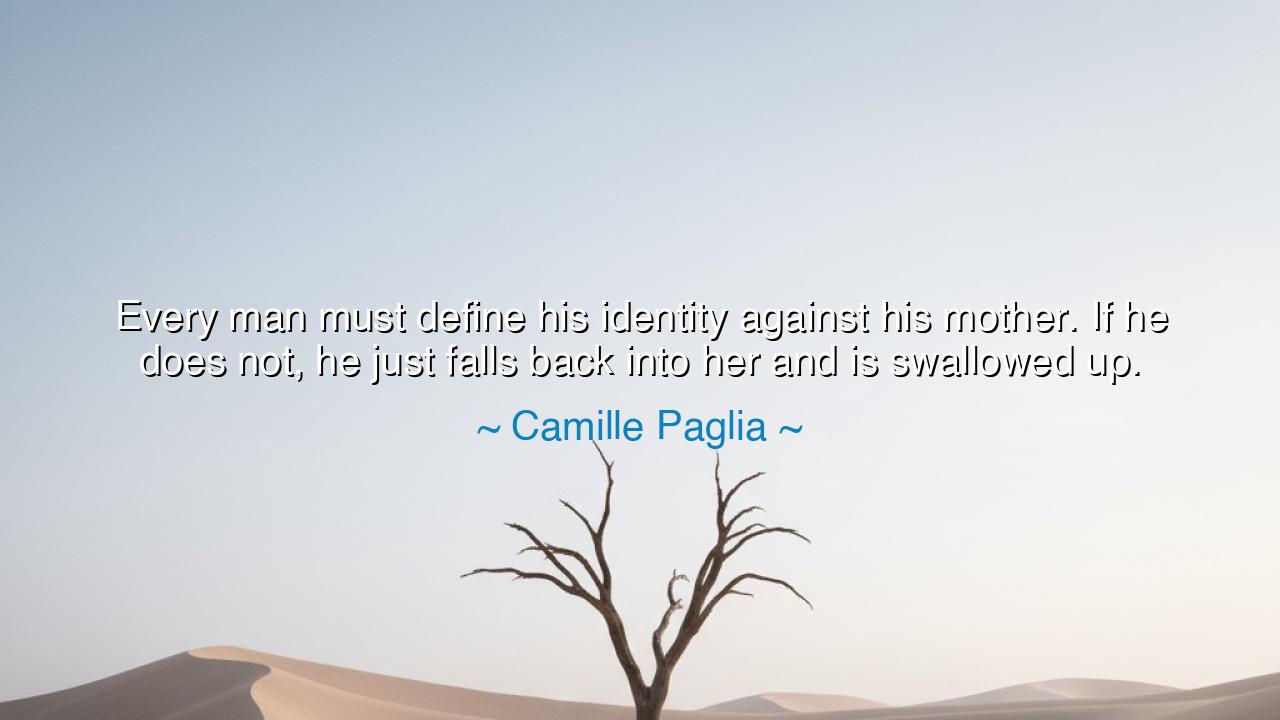
Every man must define his identity against his mother. If he does
Every man must define his identity against his mother. If he does not, he just falls back into her and is swallowed up.






In the fierce and penetrating words of Camille Paglia, “Every man must define his identity against his mother. If he does not, he just falls back into her and is swallowed up,” we hear not contempt, but the deep echo of an ancient struggle—the eternal dance between creation and independence, between the mother and the son, between the giver of life and the seeker of self. Paglia, a thinker both fearless and fiery, speaks not only of gender, but of the human condition itself: that to become one’s own being, one must emerge from the shadow of origin. Her words are not a rejection of the mother, but a recognition of her immense power—the gravitational pull of love so profound that, if not understood and transcended, can keep a soul forever in orbit, never free to become its own star.
The origin of this quote arises from Paglia’s lifelong study of art, psychology, and mythology. In her writings, she often explored the forces of nature and culture, of the maternal and the masculine, seeing in them the eternal tension that fuels civilization. The mother, in her view, represents the primal source—chaos and creation intertwined. From her body springs life itself, but that same body also symbolizes the return to formlessness, the abyss from which man must wrestle himself free to claim individuality. Thus, Paglia’s words are both a warning and a call to heroism: that every man, to truly live, must step out from the shelter of maternal love and confront the storm of the world, defining his own identity, purpose, and will.
The ancients knew this truth long before the pen of modern philosophers touched parchment. In the myth of Oedipus, the son who fails to separate himself from his mother’s influence becomes both destroyer and destroyed—his tragedy not merely in his crime, but in his inability to escape the pull of fate, of the maternal force. In contrast stands Telemachus, the son of Odysseus, who, though born in his father’s absence, must grow into his own strength beneath the watchful eyes of his mother, Penelope. When Athena visits him, she does not tell him to reject his mother, but to rise beyond her—to leave the home, seek his father, and find his destiny. In this, the goddess teaches what Paglia later names: that a son’s journey to manhood is not born in rebellion alone, but in the balance of reverence and release.
To “define one’s identity against the mother” does not mean to despise her; it means to recognize her influence and then transcend it. The son who remains a child in her presence cannot stand before the world as a man. For the mother, in her boundless love, may unconsciously bind him—protecting him so fiercely that he forgets the art of struggle. Paglia’s warning is for the spirit itself: that love, when not tempered with distance, can consume individuality. To be “swallowed up” by the mother is to live without edges, without the courage to stand apart. Just as the seed must break from the soil that nourished it, so too must the son rise beyond the embrace that gave him life.
History offers countless mirrors of this truth. Alexander the Great, though crowned in glory, lived in constant tension with his mother, Olympias, a woman of powerful will and mystical influence. She saw herself as divine, and in her son’s victories, she sought her own immortality. Alexander revered her, yet struggled to free himself from her shadow. Their bond was both his strength and his burden—her ambition coursing through his veins even as he sought to prove his independence upon the battlefield. In this, Alexander lived Paglia’s paradox: to honor the mother’s fire, yet to resist being consumed by it.
Paglia’s words, though fierce, carry a universal message: that every human being must, in some form, separate from the forces that shaped them. The mother stands as symbol for origin, comfort, the familiar—the very soil of our identity. But to remain rooted too long is to wither in the safety of the past. Growth demands distance; wisdom demands struggle. The man who defines himself apart from his mother is not rejecting her love—he is fulfilling its purpose. For no true mother wishes her child to remain a child forever. The greatest proof of her success is not dependence, but independence—a life that carries her teaching, yet walks on its own.
Let this truth be handed down as a lesson for all generations: gratitude must be balanced with growth, reverence with responsibility. The mother gives life, but the son must give it meaning. To be “swallowed” by one’s origin is to refuse the call of destiny; to rise beyond it is to honor the source from which one came. Stand, then, in the light of your beginnings, but do not live there. Let your mother’s love be your foundation, not your prison; her guidance, your compass, not your cage.
Thus, in the fierce wisdom of Camille Paglia’s words lies both tenderness and truth. The mother is the ocean from which we rise, but no sailor can remain in the harbor forever. The world awaits beyond the horizon, and to reach it, one must set sail—grateful for the tide that bore them, yet strong enough to command their own course. For in defining oneself against the mother, one does not lose her; one fulfills her deepest hope: that her child will live freely, bravely, and wholly as their own creation.






AAdministratorAdministrator
Welcome, honored guests. Please leave a comment, we will respond soon